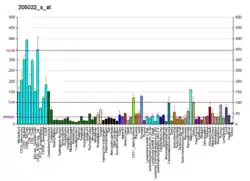FOXN3
Forkhead box protein N3 is a protein that in humans is encoded by the FOXN3 gene.[3][4]
This gene is a member of the forkhead/winged helix transcription factor family. Checkpoints are eukaryotic DNA damage-inducible cell cycle arrests at G1 and G2. Checkpoint suppressor 1 suppresses multiple yeast checkpoint mutations including mec1, rad9, rad53 and dun1 by activating a MEC1-independent checkpoint pathway. Alternative splicing is observed at the locus, resulting in distinct isoforms.[4]
See also
References
- GRCh38: Ensembl release 89: ENSG00000053254 - Ensembl, May 2017
- "Human PubMed Reference:". National Center for Biotechnology Information, U.S. National Library of Medicine.
- Pati D, Keller C, Groudine M, Plon SE (Jun 1997). "Reconstitution of a MEC1-independent checkpoint in yeast by expression of a novel human fork head cDNA". Mol Cell Biol. 17 (6): 3037–46. PMC 232156. PMID 9154802.
- "Entrez Gene: CHES1 checkpoint suppressor 1".
Further reading
- Maruyama K, Sugano S (1994). "Oligo-capping: a simple method to replace the cap structure of eukaryotic mRNAs with oligoribonucleotides". Gene. 138 (1–2): 171–4. doi:10.1016/0378-1119(94)90802-8. PMID 8125298.
- Field LL, Tobias R, Thomson G, Plon S (1996). "Susceptibility to insulin-dependent diabetes mellitus maps to a locus (IDDM11) on human chromosome 14q24.3-q31". Genomics. 33 (1): 1–8. doi:10.1006/geno.1996.0153. PMID 8617492.
- Hillier LD, Lennon G, Becker M, et al. (1997). "Generation and analysis of 280,000 human expressed sequence tags". Genome Res. 6 (9): 807–28. doi:10.1101/gr.6.9.807. PMID 8889549.
- Suzuki Y, Yoshitomo-Nakagawa K, Maruyama K, et al. (1997). "Construction and characterization of a full length-enriched and a 5'-end-enriched cDNA library". Gene. 200 (1–2): 149–56. doi:10.1016/S0378-1119(97)00411-3. PMID 9373149.
- Yu Y, Zhang C, Zhou G, et al. (2001). "Gene expression profiling in human fetal liver and identification of tissue- and developmental-stage-specific genes through compiled expression profiles and efficient cloning of full-length cDNAs". Genome Res. 11 (8): 1392–403. doi:10.1101/gr.175501. PMC 311073. PMID 11483580.
- Strausberg RL, Feingold EA, Grouse LH, et al. (2003). "Generation and initial analysis of more than 15,000 full-length human and mouse cDNA sequences". Proc. Natl. Acad. Sci. U.S.A. 99 (26): 16899–903. doi:10.1073/pnas.242603899. PMC 139241. PMID 12477932.
- Heilig R, Eckenberg R, Petit JL, et al. (2003). "The DNA sequence and analysis of human chromosome 14". Nature. 421 (6923): 601–7. doi:10.1038/nature01348. PMID 12508121.
- Ota T, Suzuki Y, Nishikawa T, et al. (2004). "Complete sequencing and characterization of 21,243 full-length human cDNAs". Nat. Genet. 36 (1): 40–5. doi:10.1038/ng1285. PMID 14702039.
- Lehner B, Sanderson CM (2004). "A protein interaction framework for human mRNA degradation". Genome Res. 14 (7): 1315–23. doi:10.1101/gr.2122004. PMC 442147. PMID 15231747.
- Suzuki Y, Yamashita R, Shirota M, et al. (2004). "Sequence comparison of human and mouse genes reveals a homologous block structure in the promoter regions". Genome Res. 14 (9): 1711–8. doi:10.1101/gr.2435604. PMC 515316. PMID 15342556.
- Gerhard DS, Wagner L, Feingold EA, et al. (2004). "The status, quality, and expansion of the NIH full-length cDNA project: the Mammalian Gene Collection (MGC)". Genome Res. 14 (10B): 2121–7. doi:10.1101/gr.2596504. PMC 528928. PMID 15489334.
- Scott KL, Plon SE (2005). "CHES1/FOXN3 interacts with Ski-interacting protein and acts as a transcriptional repressor". Gene. 359: 119–26. doi:10.1016/j.gene.2005.06.014. PMID 16102918.
- Busygina V, Kottemann MC, Scott KL, et al. (2007). "Multiple endocrine neoplasia type 1 interacts with forkhead transcription factor CHES1 in DNA damage response". Cancer Res. 66 (17): 8397–403. doi:10.1158/0008-5472.CAN-06-0061. PMID 16951149.
- Katoh H, Ojima H, Kokubu A, et al. (2007). "Genetically distinct and clinically relevant classification of hepatocellular carcinoma: putative therapeutic targets". Gastroenterology. 133 (5): 1475–86. doi:10.1053/j.gastro.2007.08.038. PMID 17983802.
External links
- CHES1+protein,+human at the US National Library of Medicine Medical Subject Headings (MeSH)
This article is issued from Wikipedia. The text is licensed under Creative Commons - Attribution - Sharealike. Additional terms may apply for the media files.




